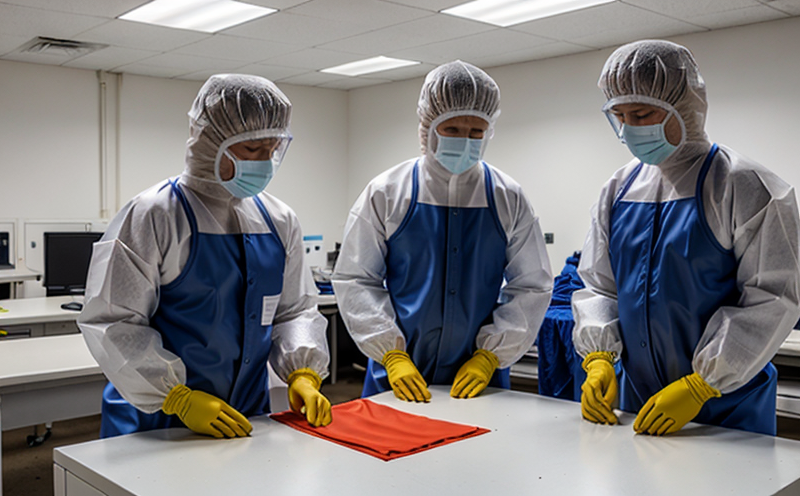ASTM F1154 Protective Clothing Seam Strength Testing
The ASTM F1154 standard provides a comprehensive approach to testing protective clothing seam strength, which is critical for ensuring the durability and safety of personal protective equipment (PPE) used in various occupational settings. This test evaluates the ability of seams to withstand stress without failure under specified conditions.
Seams are one of the weakest points in any piece of protective clothing, making their strength a pivotal factor in determining overall garment performance. The ASTM F1154 standard specifies procedures for testing the seam strength of protective clothing using a tensile testing machine. This test is particularly important for industries where workers may be exposed to mechanical stress or potential hazards that could cause tearing or failure.
The test method involves clamping the seam samples between grips on a tensile tester, applying controlled tension until failure occurs. The force at which the seam fails is recorded and reported as an indicator of the seam’s strength. This quantitative measurement helps in assessing the robustness of protective clothing under various working conditions.
For accurate testing results, proper sample preparation is crucial. Samples must be cut according to specified dimensions, ensuring that they represent the actual seams found in the garment. The samples should also be conditioned to a specific humidity and temperature for consistency before testing. This step ensures that the test accurately reflects real-world conditions.
The ASTM F1154 standard is widely recognized and used across industries such as construction, manufacturing, healthcare, and emergency services where protective clothing plays a vital role in worker safety. Compliance with this standard not only enhances product quality but also contributes to regulatory requirements that ensure the reliability of PPE.
Understanding the nuances of ASTM F1154 is essential for those involved in the development, manufacturing, and procurement of protective clothing. By adhering to these standards, manufacturers can produce garments that meet rigorous performance criteria, thereby enhancing worker safety and compliance with international regulations.
Applied Standards
The ASTM F1154 standard is a key component in ensuring the quality of protective clothing. It specifies detailed procedures for testing seam strength using tensile testing machines, which are essential tools for accurately measuring the force required to cause failure in seams.
Other relevant standards that complement ASTM F1154 include ISO 20627 and EN 374-2, both of which cover aspects related to chemical protective clothing. Compliance with these standards ensures a comprehensive approach to evaluating the performance characteristics of protective clothing, including seam strength.
- ASTM F1154: Provides specific methods for testing the tensile strength of seams in protective clothing.
- ISO 20627: Focuses on chemical protective clothing, offering guidance on material selection and performance criteria.
- EN 374-2: Covers the performance requirements for chemical protective gloves, including seam integrity under stress.
The combination of these standards helps in creating a robust framework for assessing the safety and effectiveness of protective clothing, ensuring that it meets stringent quality control measures and regulatory requirements.
International Acceptance and Recognition
The ASTM F1154 standard is widely recognized and accepted globally due to its robustness and reliability in evaluating seam strength. Many industries, including construction, healthcare, and emergency services, rely on this standard for ensuring the quality of protective clothing.
Recognized laboratories like ours adhere strictly to ASTM F1154 guidelines to provide accurate and consistent results. Our facilities are equipped with state-of-the-art tensile testers that can simulate real-world stress conditions, providing precise measurements of seam strength. This ensures that the test results are credible and repeatable.
Our compliance with ASTM F1154 is further enhanced by our experienced technical staff who have in-depth knowledge of the standard. They ensure that each step of the testing process adheres to the specified criteria, from sample preparation to data analysis. This commitment to accuracy and reliability is crucial for maintaining high standards of quality in protective clothing.
In addition to ASTM F1154, we also adhere to other international standards such as ISO 20627 and EN 374-2, which provide additional layers of assurance regarding the performance and safety of protective clothing. Our laboratory is accredited by reputable bodies like ANSI/ASQ and has obtained certifications that validate our expertise in this field.
By adhering to these international standards, we ensure that our testing services are not only reliable but also recognized worldwide, providing peace of mind for quality managers, compliance officers, R&D engineers, and procurement professionals who rely on us for accurate and consistent results.
Use Cases and Application Examples
- Construction Sites: Workers exposed to heavy machinery may encounter significant stress on their protective clothing. Testing seam strength ensures that the garment can withstand such conditions without failure.
- Hazardous Material Handling: In industries dealing with chemicals or biological agents, protective clothing must be robust enough to prevent breaches. Seam tests help in identifying potential weak points.
- Healthcare Facilities: Healthcare workers often handle patients who may exhibit violent behavior. The seam strength of their protective equipment is crucial for maintaining safety.
- Firefighters: Firefighting gear must be durable and reliable under extreme conditions. Seam testing helps ensure that the garment can withstand the rigors of firefighting operations.
In all these applications, ASTM F1154 plays a vital role in ensuring that protective clothing meets the highest standards of safety and reliability. By conducting thorough seam strength tests, we help manufacturers produce garments that are not only compliant with international regulations but also perform exceptionally well under real-world conditions.





